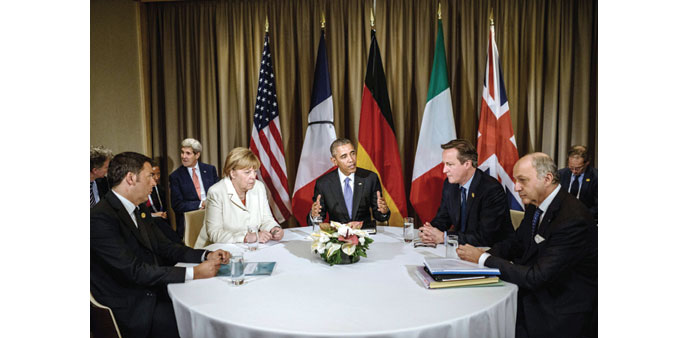Italian Prime Minister Matteo Renzi, German Chancellor Angela Merkel, US President Barack Obama, British Prime Minister David Cameron and French Foreign Minister Laurent Fabius attend a meeting during the G20 summit in Antalya yesterday.
Reuters
Belek, Turkey
World leaders vowed tighter border controls, more intelligence sharing and a crackdown on terrorist financing after the Paris attacks, but there was little sign at a summit yesterday of a dramatic shift in strategy against Islamic State in Syria.
US President Barack Obama, speaking at the end of the G20 meetings in Turkey, said the co-ordinated attacks in the French capital were a setback in the fight against the militants, but that putting US troops on the ground in Syria to combat them “would be a mistake”.
The attacks across Paris, which killed 129 people at a concert, restaurants and a soccer stadium on Friday, underlined the threat posed by Islamic State (also known as ISIL and IS) far beyond its strongholds in Syria and Iraq. They overshadowed the two-day summit, which took place just 500km from Syria.
“ISIL is the face of evil,” Obama told a news conference, describing the attacks as a “terrible and sickening” setback but adding that progress against the group was being made.
“Tragically, Paris is not alone. We’ve seen outrageous attacks by ISIL in Beirut, last month in Ankara, routinely in Iraq. Here at the G20, our nations have sent an unmistakable message, that we are united against this threat,” he said.
Concerned about the “acute and growing flow of foreign terrorist fighters”, G20 leaders agreed to step up border controls and aviation security, in a joint statement that marked a rare departure from their usual focus on the global economy.
They condemned the Paris attacks as “heinous” and said they remained committed to tackling terrorist financing.
“This is the first time the G20 has actually gone into this sort of detail ... There was a real sense of solidarity between everyone present,” French Foreign Minister Laurent Fabius said.
French warplanes pounded positions held by Islamic State in Syria on Sunday in what Fabius described as self-defence, while Obama said the US-led coalition was accelerating efforts to find partners in the fight on the ground.
Prime Minister David Cameron said he wanted Britain to also carry out air strikes in Syria but still needed to convince more lawmakers to back such action, while German Chancellor Angela Merkel said the fight against terrorism could not be won by military force alone.
US-led efforts to fight Islamic State were complicated when Russia joined the conflict a month and a half ago, targeting what the West says are mainly fighters battling President Bashar al-Assad, Moscow’s ally, rather than focusing on Islamic State.
Obama met Russian President Vladimir Putin in an informal meeting lasting around 30 minutes at the summit on Sunday, a discussion which a Kremlin spokesman said had been constructive but not groundbreaking. Obama made no mention of their meeting at his news conference.

